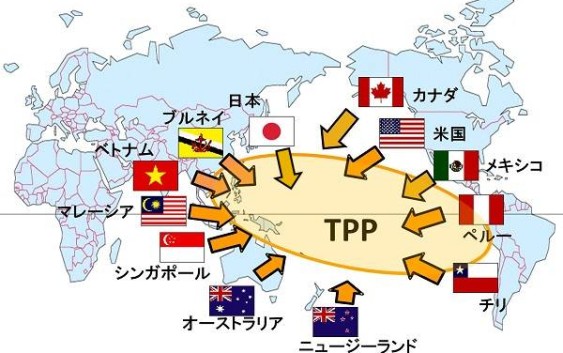The Yomiuri Shimbun – October 6, 2016 – Japan should lead other countries to boost the momentum for the implementation of the Trans-Pacific Partnership (TPP) trade pact, all the more so because it remains uncertain what the United States will do regarding the accord.
The bill to approve the agreement is the biggest focal issue of the ongoing Diet session. At a House of Councillors Budget Committee meeting, Prime Minister Shinzo Abe said emphatically: “An economic zone will be created under free, new trade rules. It will certainly contribute greatly to Japan’s growth.”
The TPP is a pillar of the government’s growth strategy, which aims to make use of the vitality of the countries in the Asia-Pacific region. It should be ratified during this Diet session without fail.
It is questionable that during the Diet deliberations on the accord the Democratic Party cited, as a reason for its opposition to the bill, the likelihood that the United States may fail to ratify the pact in the face of cautious views prevailing in Congress. “There’s no need for only Japan to hurry up [with Diet approval],” the DP asserted.
U.S. presidential candidate Hillary Clinton has declared that she would renegotiate the pact, while her rival, Donald Trump, has made it clear that he opposes the TPP. If Japan delays its approval, U.S. opponents of the trade accord will gain strength, thus escalating calls to renegotiate the pact.
U.S. President Barack Obama is still seeking to have the pact ratified within this year. It is important that Japan supports this goal with early Diet approval.
TPP minister Nobuteru Ishihara, during a meeting of the Liberal Democratic Party, said, “As uncertainties have grown in Northeast Asia, the TPP is strategically meaningful.” He also disclosed that the United States has called for early Diet approval, “wanting Japan to take the initiative” toward ratification of the pact.
Sense of urgency needed
The TPP can significantly contribute to regional peace and prosperity by setting trade and investment rules — with a high degree of freedom — for the 12 participating countries, including Japan and the United States. The pact includes the strategic aim of incorporating China into this new economic order in the future.
A delay in TPP taking effect would adversely affect various other free-trade talks, including an economic partnership agreement (EPA) between Japan and the European Union. Expansion of protectionism that would close each country’s market should be avoided.
The DP is also criticizing the TPP accord because in accepting the pact, Japan failed to maintain tariffs on items within “five key categories” of products, including rice, beef and pork. But as far as those farm products imported to Japan are concerned, Japan is the only participating country with a tariff elimination rate for these products at a distinctively low 80-percent level. If the TPP were renegotiated, such results could be lost.
It is a matter of regret that a sense of urgency appears to be lacking within the government and the ruling parties.
Teru Fukui, an LDP member of the House of Representatives, has resigned as a director of the lower house special committee on the TPP trade deal for having hinted at “steamrolling” the TPP bill through the Diet. It was also found that there were a number of defects in the translation of the accord and written explanations compiled by the Foreign Ministry. They should brace themselves to face Diet deliberations.
Another problem that has come to light is the shady dealings under which some foreign rice, which is traded under state control, had been distributed at prices lower than government-set official prices. The Agriculture, Forestry and Fisheries Ministry should expedite its efforts to investigate the case and take appropriate action.

